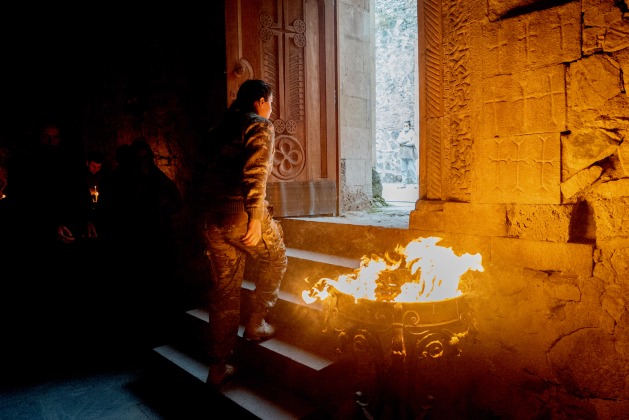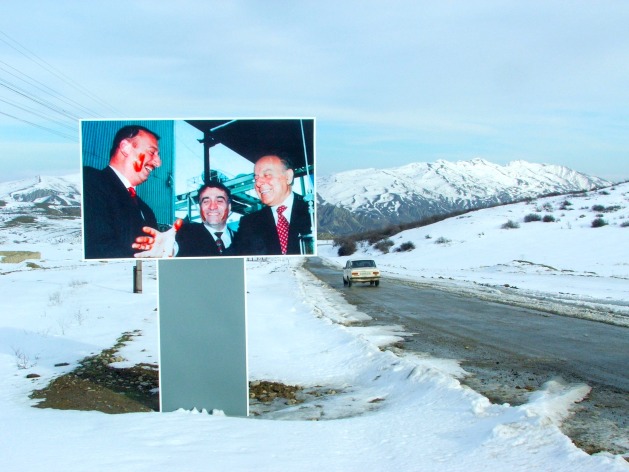ROME, Nov 04 (IPS) – On December 12, 2022, a group of Azerbaijani environmentalists blocked the only road connecting Armenia with the Nagorno-Karabakh enclave. The news went largely unnoticed by mainstream media, perhaps because it was difficult to understand.
How could a group of so-called environmental activists block the free movement of people and basic supplies? And where, exactly, is Nagorno-Karabakh? Ten months later, the entire population of the enclave was fleeing to Armenia in what many described as a televised act of ethnic cleansing.
By the time the world began to look for this Armenian enclave on a map of the Caucasus, it was already too late. “Almost no one saw it coming,” wrote The New York Times about the events that erased Nagorno-Karabakh from the map—and from history. And it is a painful history.
During the Soviet collapse in 1991, the conflict between Armenians and Azerbaijanis triggered a wave of forced expulsions. In the disputed enclave, the first Karabakh war (1988-1994) ended with an Armenian victory which led to the exodus of hundreds of thousands of Azerbaijanis to Azerbaijan.
For 25 years, the Armenians in the enclave enjoyed a republic of their own which no one recognized. They renamed it with its ancient name: Artsakh. Meanwhile, Azerbaijan used this time to invest oil and gas profits into high-tech military capabilities.
They were used in the second Nagorno-Karabakh war: The Azerbaijani victory was declared in the fall of 2020 after 44 days of horror. For Baku, however, it was an “incomplete” victory: the Armenians had lost two-thirds of the territory under their control, but still remained in the capital and surrounding districts.
By autumn 2021, Azerbaijan was tightening its grip, choking off villages along its southern border with Armenia and effectively annexing swaths of land. In 2022, it launched a massive artillery offensive along much of the Armenia-Azerbaijan border.
But 2023 was much worse. The beginning of the end came with those young members of pro-government groups who posed as “eco-activists.” With the backing of the Azerbaijani army, the blockade lasted nine months, until Armenians fleden masse in late September following Baku’s final, decisive attack on the enclave.
Former International Criminal Court prosecutor Luis Moreno Ocampo labelled the Azerbaijani aggression as “genocide.”
Since then, the displaced community has watched helplessly as videos posted by Azerbaijani soldiers depict the looting of abandoned homes, the desecration of cemeteries, and the destruction of archaeological heritage, including thousand-year-old churches.
There are also concerns about the condition of the Armenian prisoners of war. Baku acknowledges holding 23, though human rights organizations estimate the number to exceed a hundred. Information on their status and judicial proceedings remains unknown.

Gold
On June 20, 2023, massive protests erupted in the Azerbaijani town of Söyüdlü—200 kilometers west of Baku—after the announcement of a second artificial lake intended to store toxic waste from a local gold mine.
Residents had already reported severe health issues, including high cancer rates, due to water and soil contamination from a similar lake built in 2012. Crops and livestock were also affected.
Unlike six months earlier, the protest was violently suppressed by police. Press access was restricted, and several individuals were arrested on bogus charges that included “drug trafficking.”
Once again, the news barely reached beyond outlets focused on the Caucasus. Moreover, it might have been hard to explain to the rest of the world that the country hosting the United Nations Climate Change Conference (COP29) this November (from the 11th to the 22nd) was using excessive force to suppress an environmental protest.
How could this even be explained—a conference hosted by a country whose economy depends on Caspian oil and gas extraction? Why does the United Nations trust a nation that routinely attacks its Armenian neighbors and imprisons or exiles political opponents, human rights activists, and journalists?
On September 24, Human Rights Watch noted that this is the third consecutive year the COP is held in a “repressive state that severely limits freedom of expression and peaceful assembly” (the previous ones being Dubai and Egypt).
…




